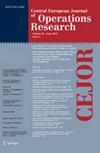通过ENCKEP模拟器测试国际肾脏交换计划的再优化策略
IF 2.3
4区 管理学
Q3 OPERATIONS RESEARCH & MANAGEMENT SCIENCE
Central European Journal of Operations Research
Pub Date : 2023-09-17
DOI:10.1007/s10100-023-00880-2
引用次数: 0
摘要
我们使用由ENCKEP COST Action开发的模拟器测试了国际肾脏交换计划的再优化策略。大多数欧洲国家正在实施肾脏交换方案,以促进与不相容的活体供体交换肾供体。国家和国际kep的最佳解决方案通常每三个月根据个人免疫学数据估计的兼容性选择一次。然而,这些估计并不总是准确的,如果在实验室交叉匹配测试中发现阳性交叉匹配,则必须取消相应的交换周期(或链)。根据匹配过程的不同,协调器可以使用不同的重新优化策略来修复失败的解决方案。我们研究了使用不同优化策略进行多轮再优化的效果,例如在中间解决方案中固定良好的周期,或者在前几轮中优先考虑具有阴性交叉匹配测试的移植。在国际kep的背景下,我们还考虑在解决方案中测试和优先考虑国家移植的可能性。我们根据移植数量和在一段时间内进行的相容性测试数量来衡量这些政策的表现。通过扩展我们在[16]中提出的结果,我们对大量实例进行了模拟,以测量各种重新优化策略的效果。我们的主要发现表明移植数量与测试和重新优化轮次数量之间存在明显的权衡关系。本文章由计算机程序翻译,如有差异,请以英文原文为准。
Testing re-optimisation strategies in international kidney exchange programmes by the ENCKEP simulator
Abstract We tested re-optimisation strategies for international kidney exchange programmes using the simulator developed by the ENCKEP COST Action. Kidney exchange programmes (KEPs) are operating in most of the European countries to facilitate the exchange of kidney donors for the recipients with incompatible living donors. The optimal solutions for national and international KEPs are typically selected in every three months based on the compatibilities estimated on the individual immunological data. However, these estimations are not always accurate, and if a positive crossmatch is found in the laboratory crossmatch tests then the corresponding exchange cycle (or chain) must be cancelled. Depending on the matching process, the coordinators may use different re-optimisation strategies to repair the failed solutions. We examine the effects of using multiple rounds of re-optimisation with different optimisation strategies, such as fixing good cycles in the intermediate solutions or prioritising transplants with negative crossmatch tests in previous rounds. In the context of international KEPs we also consider the possibility of testing and prioritising national transplants in the solutions. We measure the performance of these policies regarding the number of transplants and the number of compatibility tests conducted in a time period. By extending our results presented in [16], we performed simulations for a large number of instances to measure the effects of various re-optimisation policies. Our main findings show a clear trade-off in the number of transplants versus the number of tests and re-optimisation rounds.
求助全文
通过发布文献求助,成功后即可免费获取论文全文。
去求助
来源期刊

Central European Journal of Operations Research
管理科学-运筹学与管理科学
CiteScore
4.70
自引率
11.80%
发文量
30
审稿时长
3 months
期刊介绍:
The Central European Journal of Operations Research provides an international readership with high quality papers that cover the theory and practice of OR and the relationship of OR methods to modern quantitative economics and business administration.
The focus is on topics such as:
- finance and banking
- measuring productivity and efficiency in the public sector
- environmental and energy issues
- computational tools for strategic decision support
- production management and logistics
- planning and scheduling
The journal publishes theoretical papers as well as application-oriented contributions and practical case studies. Occasionally, special issues feature a particular area of OR or report on the results of scientific meetings.
 求助内容:
求助内容: 应助结果提醒方式:
应助结果提醒方式:


